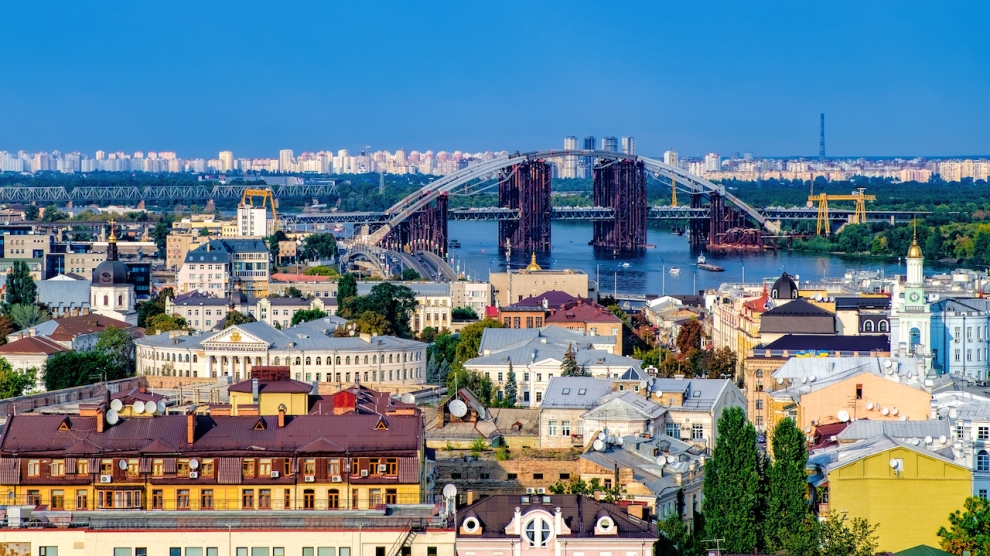Within the last three years the Ukrainian government has introduced more reforms than all the governments of the previous 15 years, says Satu Kahkonen, country director for Belarus, Moldova, and Ukraine at the World Bank. She spoke to Andrew Wrobel about the business climate in Ukraine and the impact of the conflict in the east of the country.
The World Bank has been helping Ukraine for over two decades. What is your involvement in the country like now?
In Ukraine, the World Bank is one of the major development partners. Since May 2014, we have provided more than $4.4 billion in assistance to Ukraine, both in the form of policy development loans and investment projects. We have a large investment portfolio at the moment, amounting to about $2.8 billion.
There are eight investment operations which support basic public services that aim to benefit the ordinary people. We are supporting water supply, sanitation, heating, energy, health, social protection, and energy efficiency and growth. Adjacent to that, we are also heavily engaged in policy dialogue.

What areas does the policy dialogue cover?
It’s quite a wide-ranging policy dialogue. Let me tell you a little bit about the path first and then I can talk about what we are doing now, and how we are moving forward.
The main instrument that the World Bank has to support policy dialogue is technical assistance, but we also have our development policy operations that are supporting the implementation of policy reforms financially. In the last three years, we have disbursed $2.25 billion to Ukraine, through two series of development policy operations that have supported key structural reforms. That has included the movement to flexible exchange rates, the reform of energy tariffs, strengthening of the social safety net system, the stabilisation of the banking sector and procurement reform. So, there are a lot of different things. In the past three years, since Maidan, there has been quite a serious effort for reform on the government side.
But I believe these reforms need to continue.
Yes, there’s a lot more that needs to be done. At the moment our dialogue is very much focussed on anti-corruption because governance is one of the biggest problems in this country. Then there is pension reform, which is sorely needed. If the pension system is not reformed, the future generations of pensioners are going to be even poorer than pensioners are today. After that, there is land reform. Agriculture is an area where Ukraine has significant potential, and the land markets are not functioning as they should. Ukraine is one of the only two countries in Europe that don’t have properly functioning land markets, and doesn’t allow the sale of land.
We also have health care to look at. The government approved a package of health reforms a few months ago. Health is a major issue in Ukraine. Life expectancy in Ukraine is over ten years lower than in rest of Europe, which is unacceptable. Additionally, the people are very unhappy with healthcare services. The surveys show that only ten per cent of the population is happy with the country’s healthcare services, so this reform is something that is greatly needed. Obviously, the banking sector reform will need to continue, so that’s also something that we are focusing on. These are just some of the areas that we are covering, but there are also others.
You have seen that since Maidan, or rather since the end of 2013, the reforms have sped up a little. Which areas do you see the biggest improvement?
The banking sector is definitely one that has to be highlighted, and the National Bank of Ukraine needs to be commended for their work. However, moving forward there’s a need to continue the efforts, strengthening the supervision and ensuring the restructuring of the sector. There’s a need to address the high level of non-performing loans (NPLs) and also to try to get the credit growth back up. Credit growth has plummeted during the crisis.
There are other areas where there has been significant progress. One example is the energy sector. The government has brought the heating tariffs to a level that covers the cost of production. Before this was a major fiscal risk; a fiscal drain, as well as a source of corruption for various people. But, again, in that area, much more needs to be done .- for example, Naftogas needs to unbundled and the EU’s third energy package implemented.
Another example is anti-corruption efforts. The electronic asset declaration was a major move forward. However, it’s only a partial reform so far because the asset declarations need to be verified and then action must be taken based on the findings of those verifications.
As you said there is still room for improvement, but what are the key challenges now and the opportunities too?
Well, we see a lot of potential for Ukraine, moving forward, but we are also worried as we see that this potential has not been tapped. One of those areas of untapped opportunity is agriculture. Another one is the geographic location of Ukraine between Europe and Asia; something that has not been fully exploited. The third opportunity is the people. Ukraine has well-educated and very entrepreneurial people. It is important to unleash the potential of that resource moving forward.
Action must be taken, and conditions need to be put in place,to take advantage of this potential. This will require securing fiscal and financial sector stability, fostering private sector competitiveness, and providing more effective health education and social protection for the people. The quality of education is a serious problem in Ukraine and, as I mentioned before, unless the pension system is reformed, this country is also going to have a serious problem with poverty in old age.

You mentioned competitiveness. That is a serious issue because Ukraine is an oligarchic country, so how do you see the situation for small and medium firms?
At the moment, they obviously face a number of hurdles. Financing is an issue given that Ukraine has come through a serious crisis in the banking sector. Private sector credit is low. In addition, the issue of access to markets is quite big in Ukraine, which is why deregulation, competition policies and anti-monopoly policies are important.
Ukraine has a large number of SMEs, but for them to be able to grow and develop further, reforms need to be taken. The business climate is an area where the government needs to take further action. If we look at the Doing Business indicators, Ukraine basically moved up during the last few years. In 2013, Ukraine was 140th in the index and in 2017 it ranks 81st, which is very good. But it’s still lagging significantly behind the other European countries. For example, areas such as permits, licenses, and inspections need to be addressed.
59 notches is an improvement but on the other hand, we see countries which have climbed up the ladder and where businesses don’t see much improvement in their day-to-day operations.
I completely agree with that. That is because the Doing Business only covers a slice of the business environment. As you said, there are countries that are taking some reforms just to move up in the rankings; the reforms may be only in the books and actual implementation may be lagging.
We are keenly aware that we cannot rely only on the Doing Business Indicators to assess the business climate. For that reason we are talking to private business people. In the past few months, I have been traveling around Ukraine and, in fact, we have had consultations with private sector representatives to find out that what constraints they are facing.
So what is the most prevalent problem that companies have in Ukraine?
Corruption is the number one issue that comes up, not just from the companies, but also from ordinary people. Companies also talk about tax administration and its unpredictability, and then about permits, licenses, inspections and certification. Some companies mention access to a skilled labour force.
Of course, there is the ongoing military conflict.
Yes, the military conflict in Ukraine has had a very widespread impact. It has affected economic activity and the prospects for the whole country. It has also impacted the people, as there has been a human cost.
The biggest economic impact has been in Donetsk and Luhansk, which used to be the industrial heartland of the country. They accounted for almost one-quarter of Ukraine’s industrial activity and the same share of Ukraine’s exports. So when that all but disappeared, the economy was hurt.
Secondly, the conflict has significantly undermined investor confidence in Ukraine. Obviously, when investors see that there is a military conflict going on in one part of the country, they become hesitant to enter. Thirdly, there have been widespread job losses.
Then there is the human cost. In addition to the about 10,000 people that have been killed in the conflict, there are 2.7 million people that have been displaced – that’s about five per cent of the population. Some of them, about one million people, have left the country, and 1.7 million have moved elsewhere in Ukraine.
Do you think there is a chance of higher economic growth now, despite the conflict? In Q4 2016 the GDP growth equalled 4.7 per cent.
Yes, I think that the biggest economic impact of the conflict we have already seen, given that the revenues from the region under conflict went down by 40 per cent already as far back as 2014. There should be no further revenue effects, but the conflict is not over yet and it is continuing to affect the country fiscally, as military expenditures are taking a large share of the budget. In fact, up to five-percentage points of GDP is allocated to military spending. That’s a significant amount of money that could be otherwise allocated to services that benefit ordinary people.

At the beginning, we touched briefly on exports. How do you the Deep and Comprehensive Free Trade Area (DCFTA), which is part of the Association Agreement (AA), can help offset the fall of exports to CIS countries and increase exports to the EU?
The trade diversion is something we have expected to see, but the increase is not showing up in the numbers yet. We know that the movement is there, but it will take time for Ukraine to see the full advantage of the trade agreement.
There is also the issue of certification and standards that some Ukrainian companies have yet to meet, before they can start trading with the EU.
Yes, it is a challenge. I have talked to agribusinesses and one of the issues they are facing is meeting the phytosanitary standards, which are different from those in the CIS countries. At the same time there areas, such as engineering and IT services, in Ukraine that have started growing again. Those services are exported to the EU and already meet all the requirements.
That leads me to the issue of foreign direct investment (FDI) in Ukraine. Every single country wants to attract investors. Do you see Ukraine as an FDI destination at the moment?
I see significant potential in this country, but at the moment it’s very difficult to attract investors to come to Ukraine, not only because of the conflict but also because of the broader investment climate. Traditional reforms and better law enforcement are going to be critical to tackle if we are to attract investors. Over and over again foreign investors tell us that they are worried about the court system; whether they function in an impartial manner and whether they can count on contract enforcement mechanisms. There is a need to strengthen property rights and investor protections in order to get the foreign investors to come.
Do you think that Ukraine has an image problem right now?
To some extent, yes. I think that there are people who have never been to Ukraine and don’t realise that the conflict is concentrated in only the eastern part, while the rest of the country is open for business. Also the country’s potential and the opportunities that are present here are not necessarily that well-known. So, there is quite a bit of work to be done if Ukraine is to present its value proposition on the international arena.
There’s a perception that very little, in terms of reforms, has happened in Ukraine in the past three years. However, if you look at the record, in fact, the government in Ukraine has introduced more reforms, in the past three years, than governments from the past 15 years. There is a move towards change here. Things have already started moving, and in the right direction, but more has to be done in order to reach the potential.






Add Comment